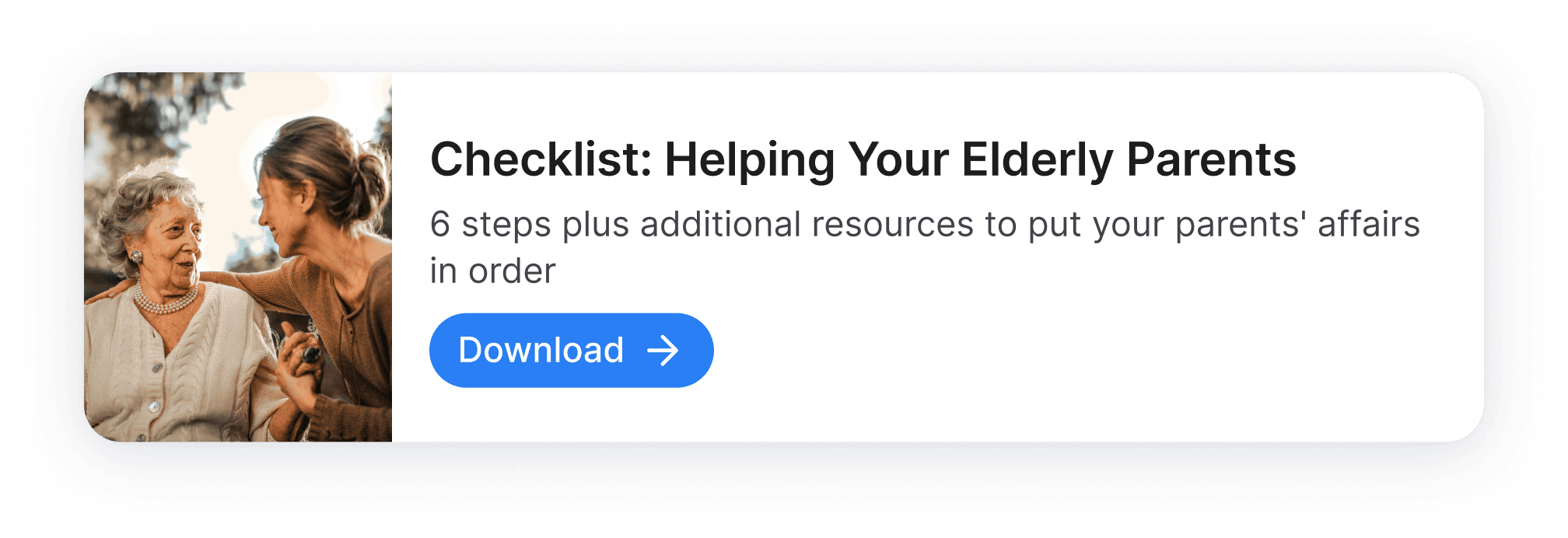When you and your elderly parents plan to distribute their assets, their home is likely one of the most valuable. However, it’s important to understand the pros and cons, including potential tax liabilities, before transferring ownership of your parents' home.
Deciding whether your elderly parents should sign over their house can be complex. We’ll explain the factors you should consider before making the call.
Key Takeaways
Transferring your parents’ house into your name could make you subject to capital gains tax and responsible for any increase in the value of the house.
There are situations where your parents’ house is not considered in their Medicaid eligibility. However, if they transfer ownership of their house anytime within the five years before they apply for Medicaid, their benefits may be delayed severely.
The most common way to transfer house ownership is through a quitclaim, gift, or beneficiary deed. However, you and your parents can also consider creating a trust or power of attorney as alternatives.
What to Consider Before Elderly Parents Sign Over a House
Tax Implications
A home transfer could be subject to capital gains tax. However, the tax is applied differently depending on how you assume ownership.
Many elderly parents bought their house long ago, and the property value has likely increased over time. If your parents sign over ownership while still alive, you will be liable for the difference in value from the original purchase price.
But if you inherit the house through a will or trust, you are responsible only for the difference in the selling price and the value at the time of inheritance.
The difference in tax liability can be massive in these situations. To avoid assuming a huge tax responsibility after receiving the house, you should thoroughly investigate any increase in the value of your parents’ home since they bought it.
Probate
Probate is the legal process of distributing somebody’s assets after death. Many people want to avoid the complex and expensive probate court procedures, but the process may be more straightforward than you think.
Sometimes, families try to avoid probate court out of fear of this process, but the complexities and expenses of probate vary depending on where you live.
In reality, only a few states have complex and expensive procedures. For this reason, you should research your state’s probate laws before deciding whether to take over ownership of your parents’ house.
An alternative, establishing a living trust, will allow you to skip the probate procedures and expenses by assigning the distribution of assets to a trustee. We'll cover that alternative later in the article.
Death of the Adult Child
Another circumstance that can affect the transfer of ownership is the unexpected passing of the adult child after inheriting the house.
The house would legally belong to the adult child and be considered their asset. In such a case, the ownership of the house would be passed down to the adult child’s heirs. The probate court would decide the distribution of the adult child’s assets under their state’s intestacy laws.
Does Your Parents' Home Affect Medicaid Eligibility?
One of the most common reasons you and your parents may think to sign over their house is to help them qualify for Medicaid.
Medicaid eligibility is determined by the monetary value of the assets an individual has. Since a home is usually one of a person's most valuable assets, you might think that transferring the ownership will decrease your parents' assets enough to qualify.
However, this is only sometimes true. There are situations when your parents' home may not qualify as an asset in consideration for Medicaid. There are also reasons why transferring ownership of your parents’ home can negatively affect their eligibility.
Josh Duncan, financial advisor from F5 Financial, explains how eligibility can be negatively affected. He says:
“If the goal is to reduce your parent’s assets so they can qualify for Medicaid, remember that Medicaid will review financial transactions over the last five years. When they see the ownership of a home transferred, they require the value of the home be used toward your parent’s care before they can be covered by Medicaid.”
If you or another dependent of your parents still lives in the house, it typically will be excluded from the consideration for Medicaid eligibility. In this instance, your parents may keep their house and still potentially qualify for Medicaid.
Another critical factor is the five-year look-back period applied to any uncompensated transfers or gifts from your parents. This rule means that in the five years before submitting a Medicaid application, a transfer of homeownership could delay your parents’ benefits. For example: If the house were valued at $300,000 and your parents required $5,000 a month in assistance, the delay would be 60 months (300,000 by 5,000).
For this reason, it is essential to consider how signing over ownership of your parent’s house may affect their eligibility.
How Elderly Parents Can Transfer a House

If you decide that signing over ownership of your parents' house is the best idea, knowing all the necessary steps is important. There are several ways to transfer ownership, but the most common is using deeds.
The three most common types of deeds used are:
1. Quitclaim Deed
A quitclaim deed gives the least responsibility to the receiver of the house.
You and your parents will sign the deed with an attorney present. Then the deed will be filed with your county and dictate the transfer of ownership of the home.
A quitclaim deed ensures there are no liens held on the property and holds the parents responsible for any remaining mortgage payments.
2. Gift Deed
A gift deed frames the ownership of the house as a gift the parents give the child.
Both parties must sign the deed, and there is no exchange of money or other compensation.
In this case, the adult child will be held liable for gift taxes and may be subject to capital gains tax if the property has increased in value.
3. Transfer on Death Deed
A transfer on a death deed signifies that the ownership of the house won’t be given to the adult child until the parents die.
A transfer on the death deed can help the adult child avoid probate court and some of the tax liabilities that may result from a gift deed.
All of these legal documents will require organizing a lot of paperwork. That’s where Trustworthy comes in: It can help you keep all your important documents in one place, hassle-free. If you need more help, you and your parents can collaborate with a Trustworthy Certified Expert™ on estate organization. Create your trusted network of family members and advisors to assign their roles while setting who has access to what documents with Trustworthy.
Alternative to Signing Over a House

There are alternatives to signing over the house that may suit you and your parents better, depending on your situation.
These options may help you avoid extra taxes and other risks in transferring ownership of your parent’s house.
Trust
A trust is a legal agreement that names a trustee responsible for distributing your parents’ assets upon their deaths. Trusts are commonly used as an alternative to wills by people who wish to avoid probate courts and keep estate planning more in-family.
A trust can contain your parents’ assets, including their house, and will dictate which beneficiary will receive which asset. Trusts can save your family money and challenges in the future.
However, the downside to a trust is that the assets transferred to it will still be considered in the five-year look-back period when your parents’ Medicaid eligibility is decided. For this reason, it is best to use a trust if your parents don’t require Medicaid or to set it up at least five years before your parents expect to need Medicaid.
Power of Attorney
Another alternative is to acquire a power of attorney, allowing you to manage and handle your parents’ assets when they no longer can.
If you are considering transferring the ownership of your parents' house because they can no longer manage it themselves, this is another option to consider.
After you and your parents complete a power of attorney, you can legally pay their bills from their accounts, sort out their finances, and manage their house for them.
This will give you more responsibility, and you will be legally required to do the best for your parents. Power of attorney can eliminate the risk of tax liability or losing Medicaid eligibility.

Frequently Asked Questions
Can my parents put me on the deed to their house?
Your parents can put your name on the deed to their house. Many people might see this as a simple method of estate planning.
However, it may be a bad idea. Depending on the type of deed, your and your parents' finances, and other factors, this could subject you to tax liabilities and affect your parents' Medicaid eligibility.
Can my parents just give me their house?
Your parents can give their house to you if they have complete ownership. They can transfer ownership to you as a gift, in which they receive no compensation in return. You may be subject to gift taxes if the house's value exceeds a certain amount.
Is it better to inherit a house or receive it as a gift?
The better option depends on your and your parents' situations, but typically, inheriting a house can allow you to avoid most taxes for capital gains. If your parents transfer the house to you while they’re still alive, you may be held responsible for paying for any increase in the house's value.
What are the disadvantages of putting your house in a trust?
Putting a house in a trust does not exclude beneficiaries from estate taxes or any outstanding debts involved with the property. Transferring a house into a trust will also be included in Medicaid's five-year look-back period when determining eligibility.
We’d love to hear from you! Feel free to email us with any questions, comments, or suggestions for future article topics.
Trustworthy is an online service providing legal forms and information. We are not a law firm and do not provide legal advice.










